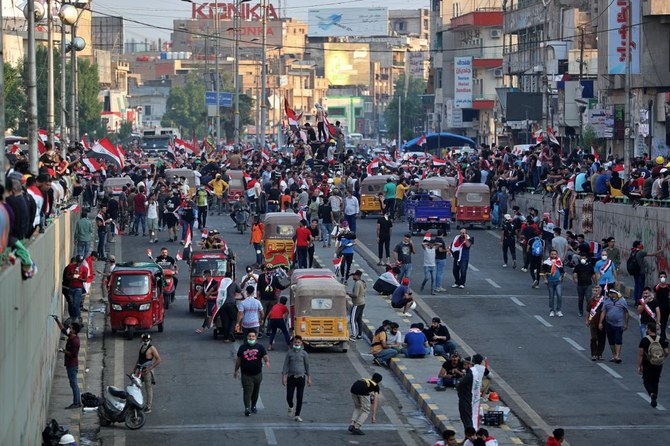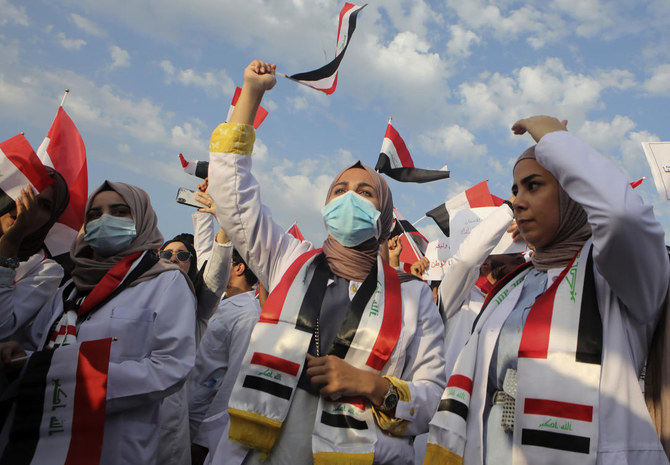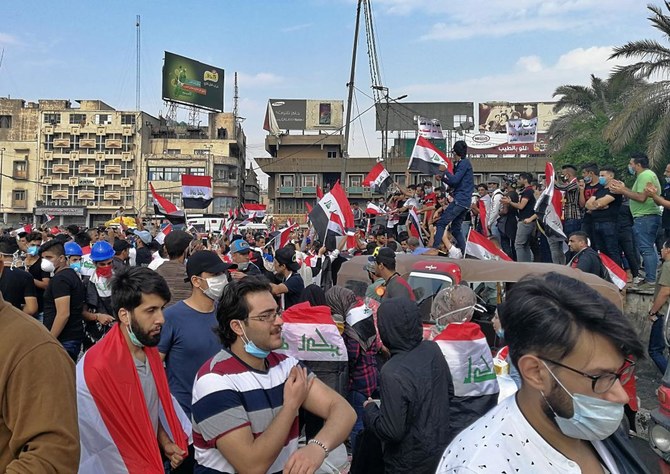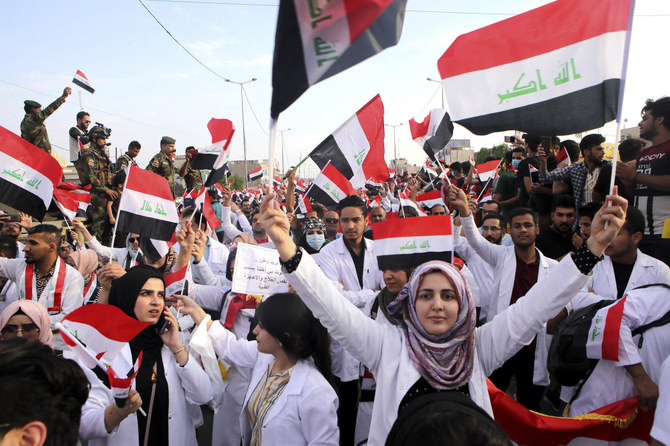BAGHDAD: Iraq’s most powerful politicians appeared to withhold support for Prime Minister Adel Abdul Mahdi on Wednesday, as anti-government protests swelled into the biggest mass demonstrations the country has seen since the fall of Saddam Hussein.
Protesters from across Iraq’s sectarian and ethnic divides thronged the center of the capital Baghdad in a show of fury at the political class. While Abdul Mahdi’s fate was not yet clear, demonstrators said removing him would not be enough.
After four weeks of protests in which more than 250 people have been killed, the past 24 hours saw the demonstrations swell to a previously unseen scale in the capital.
Middle class families with small children joined self-proclaimed “revolutionary” youths from poor neighborhoods to brave tear gas and barricades in Baghdad’s Tahrir Square.
“No Moqtada, no Hadi,” protesters chanted, denouncing what they saw as an effort by the leaders of parliament’s two largest blocs — populist cleric Moqtada Al-Sadr and militia leader Hadi Al-Amiri — to cling to power behind the scenes with or without the prime minister they installed a year ago.
Sadr has demanded Abdul Mahdi call an early election. When the premier refused, Sadr called on Amiri, his main political rival, to help oust him.
Amiri issued a statement overnight that was initially seen as accepting Sadr’s call to ditch Abdul Mahdi. But a day of silence followed, leaving the prime minister’s fate in limbo.
“We will work together to secure the interests of the Iraqi people and save the nation in accordance with the public good,” Amiri had said in the overnight statement.
Many young women and older people joined the protests as they gained momentum and appeared safer. The mood was jubilant yet defiant, with many singing and dancing and a group of young men even playing dominos, in contrast with the tense situation earlier this week when scores were killed nationwide.
One wheelchair-bound man said he came with his two young granddaughters to support the protesters.
The protesters have drawn inspiration from a similar uprising in Lebanon, where pan-sectarian anti-government protests forced Prime Minister Saad Harari to step down.
“We are staying and holding our ground. Our demand is not only to replace Adel Abdul Mahdi: we want the whole government uprooted,” said Karar Saad, 20. “All of them are thieves.”
Despite promising reforms and ordering a broad reshuffle of the cabinet, Abdul Mahdi has done little to address the demonstrators’ complaints. Parliament passed measures on Monday including reduced salaries for officials, but protesters derided this as too little too late.
The security forces responded to the initial unrest in early October with a brutal crackdown, firing with live ammunition from rooftops into crowds. But if they hoped to intimidate the demonstrators, the tactic has backfired, inflaming passions.
Despite OPEC member Iraq’s vast oil wealth, many Iraqis live in poverty or have limited access to clean water, electricity, basic health care and education. Most of the protesters are young people who above all want jobs.
While the demonstrations were initially mostly made up of young men, they have become more diverse as the crowds have swelled, with more families, women and older people braving streets strewn with tear gas canisters and debris.
“We are a people who love life, we are a country of riches that you steal. We are staying here, women and men, we will not retreat!” said Safaa, a female student. “Leave! Enough! You haven’t had enough stealing?“
She called for dismantling the entire system of power sharing among sectarian political parties, put in place after the 2003 US-led invasion that toppled Saddam.
The entrance to Tahrir Square was littered with makeshift tents on Wednesday with many protesters camping out there overnight. Young men formed human chains to keep roads clear for a flurry of tuk-tuks, which have been used to ferry the wounded through crowds from the battle lines of clashes with police.
Security forces continued to lob tear gas at protesters on a nearby bridge who sought to break into the heavily fortified Green Zone which houses government buildings. There appeared to be less tear gas than on previous days. At least 26 people were injured, medical sources said.
Protests took place in five other provinces, mostly in the southern Shiite heartland. Around 800 people gathered in the Shiite holy city of Najaf, 500 in Diwaniya, and over 1,500 in Nassiriya, where at least 51 people were wounded overnight when security forces opened fire to disperse protests.
Over 2,000 people gathered in oil-rich Basra, where operations came to a complete standstill at the Umm Qasr commodities port after protesters blocked its entrance in the previous day, port officials said.
Iraq prime minister’s fate in limbo as crowds of demonstrators swell
Iraq prime minister’s fate in limbo as crowds of demonstrators swell

- Sadr has demanded Abdul Mahdi call an early election
- When the premier refused, Sadr called on Amiri, his main political rival, to help oust him
Israel strikes Yemen’s Sana’a airport, ports and power stations

- Houthis said that multiple air raids targeted an airport, military air base and a power station in Yemen
JERUSALEM: Israel’s military said it struck multiple targets linked to the Iran-aligned Houthi movement in Yemen on Thursday, including Sana’a International Airport and three ports along the western coast.
Attacks hit Yemen’s Hezyaz and Ras Kanatib power stations as well as military infrastructure in the ports of Hodeidah, Salif and Ras Kanatib, Israel’s military added.
The Houthis have repeatedly fired drones and missiles toward Israel in what they describe as acts of solidarity with Palestinians in Gaza.
The Israeli attacks on the airport, Hodeidah and on one power station, were reported by Al Masirah TV, the main television news outlet run by the Houthis.
More than a year of Houthi attacks have disrupted international shipping routes, forcing firms to re-route to longer and more expensive journeys that have in turn stoked fears over global inflation.
Israel has instructed its diplomatic missions in Europe to try to get the Houthis designated as a terrorist organization.
The UN Security Council is due to meet on Monday over Houthi attacks against Israel, Israel’s UN Ambassador Danny Danon said on Wednesday.
On Saturday, Israel’s military failed to intercept a missile from Yemen that fell in the Tel Aviv-Jaffa area, injuring 14 people.
Syria authorities say torched 1 million captagon pills

DAMASCUS: Syria’s new authorities torched a large stockpile of drugs on Wednesday, two security officials told AFP, including one million pills of captagon, whose industrial-scale production flourished under ousted president Bashar Assad.
Captagon is a banned amphetamine-like stimulant that became Syria’s largest export during the country’s more than 13-year civil war, effectively turning it into a narco state under Assad.
“We found a large quantity of captagon, around one million pills,” said a balaclava-wearing member of the security forces, who asked to be identified only by his first name, Osama, and whose khaki uniform bore a “public security” patch.
An AFP journalist saw forces pour fuel over and set fire to a cache of cannabis, the painkiller tramadol, and around 50 bags of pink and yellow captagon pills in a security compound formerly belonging to Assad’s forces in the capital’s Kafr Sousa district.
Captagon has flooded the black market across the region in recent years, with oil-rich Saudi Arabia a major destination.
“The security forces of the new government discovered a drug warehouse as they were inspecting the security quarter,” said another member of the security forces, who identified himself as Hamza.
Authorities destroyed the stocks of alcohol, cannabis, captagon and hashish in order to “protect Syrian society” and “cut off smuggling routes used by Assad family businesses,” he added.
Syria’s new Islamist rulers have yet to spell out their policy on alcohol, which has long been widely available in the country.
Since an Islamist-led rebel alliance toppled Assad on December 8 after a lightning offensive, Syria’s new authorities have said massive quantities of captagon have been found in former government sites around the country, including security branches.
AFP journalists in Syria have seen fighters from Islamist group Hayat Tahrir Al-Sham (HTS) set fire to what they said were stashes of captagon found at facilities once operated by Assad’s forces.
Security force member Hamza confirmed Wednesday that “this is not the first initiative of its kind — the security services, in a number of locations, have found other warehouses... and drug manufacturing sites and destroyed them in the appropriate manner.”
Maher Assad, a military commander and the brother of Bashar Assad, is widely accused of being the power behind the lucrative captagon trade.
Experts believe Syria’s former leader used the threat of drug-fueled unrest to put pressure on Arab governments.
A Saudi delegation met Syria’s new leader Ahmed Al-Sharaa in Damascus on Sunday, a source close to the government told AFP, to discuss the “Syria situation and captagon.”
Jordan in recent years has also cracked down on the smuggling of weapons and drugs including captagon along its 375-kilometer (230-mile) border with Syria.
Jordan says 18,000 Syrians returned home since Assad’s fall

AMMAN: About 18,000 Syrians have crossed into their country from Jordan since the government of Bashar Assad was toppled earlier this month, Jordanian authorities said on Thursday.
Interior Minister Mazen Al-Faraya told state TV channel Al-Mamlaka that “around 18,000 Syrians have returned to their country between the fall of the regime of Bashar Assad on December 8, 2024 until Thursday.”
He said the returnees included 2,300 refugees registered with the United Nations.
Amman says it has hosted about 1.3 million Syrians who fled their country since civil war broke out in 2011, with 650,000 formally registered with the United Nations.
Lebanon hopes for neighborly relations in first message to new Syria government

- Lebanon’s Iran-backed Hezbollah played a major part propping up Syria’s ousted President Bashar Assad through years of war
- Syria’s new Islamist de-facto leader Ahmed Al-Sharaa is seeking to establish relations with Arab and Western leaders
DUBAI: Lebanon said on Thursday it was looking forward to having the best neighborly relations with Syria, in its first official message to the new administration in Damascus.
Lebanese Foreign Minister Abdallah Bou Habib passed the message to his Syrian counterpart, Asaad Hassan Al-Shibani, in a phone call, the Lebanese Foreign Ministry said on X.
Lebanon’s Iran-backed Hezbollah played a major part propping up Syria’s ousted President Bashar Assad through years of war, before bringing its fighters back to Lebanon over the last year to fight in a bruising war with Israel – a redeployment which weakened Syrian government lines.
Under Assad, Hezbollah used Syria to bring in weapons and other military equipment from Iran, through Iraq and Syria and into Lebanon. But on Dec. 6, anti-Assad fighters seized the border with Iraq and cut off that route, and two days later, Islamist militants captured the capital Damascus.
Syria’s new Islamist de-facto leader Ahmed Al-Sharaa is seeking to establish relations with Arab and Western leaders after toppling Assad.
Iraqi intelligence chief discusses border security with new Syrian administration

BAGHDAD: An Iraqi delegation met with Syria’s new rulers in Damascus on Thursday, an Iraqi government spokesman said, the latest diplomatic outreach more than two weeks after the fall of Bashar Assad’s rule.
The delegation, led by Iraqi intelligence chief Hamid Al-Shatri, “met with the new Syrian administration,” government spokesman Bassem Al-Awadi told state media, adding that the parties discussed “the developments in the Syrian arena, and security and stability needs on the two countries’ shared border.”



















